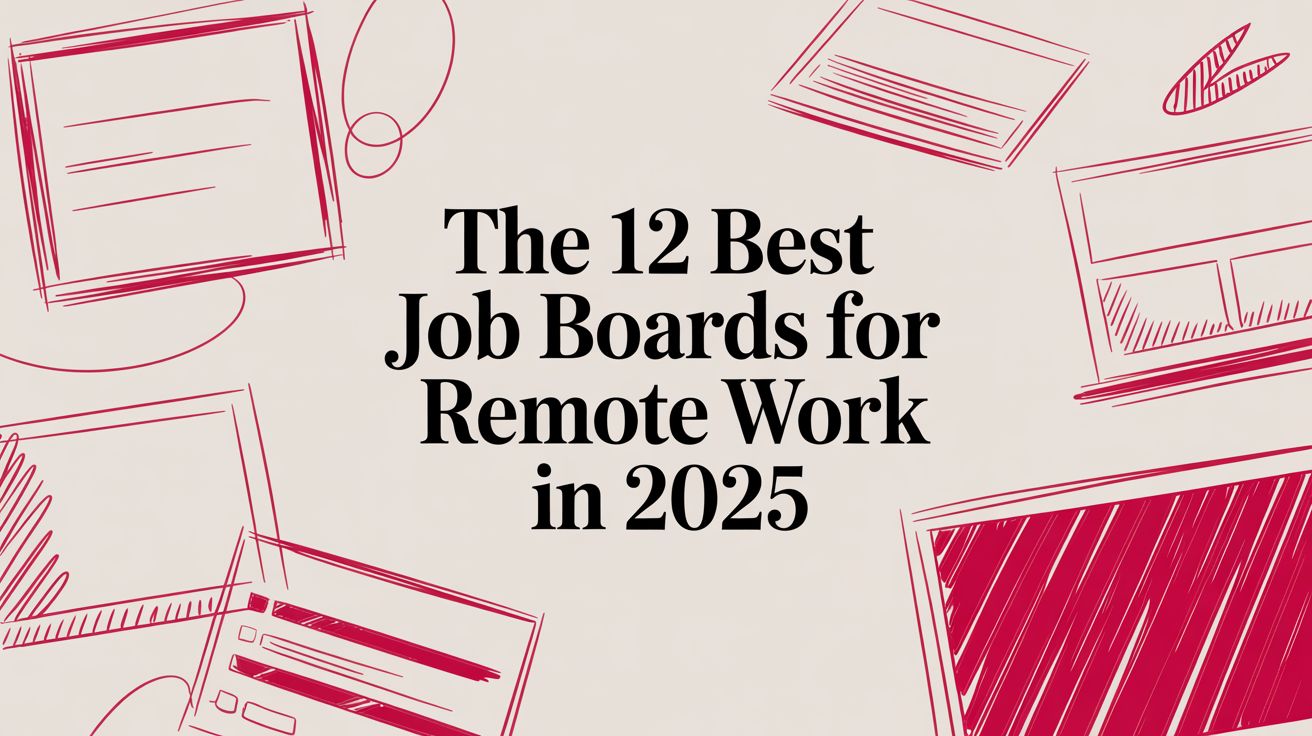The traditional path of a four-year degree is no longer the only route to a successful, high-paying career. The growth of remote work has created incredible opportunities for skilled individuals, regardless of their formal education. This guide cuts directly to the chase, exploring eight of the highest paying remote jobs without a degree that you can pursue today. We will break down the essential skills, realistic salary expectations, and actionable steps to help you land a role that offers both financial freedom and flexibility.
Our focus is on roles where demonstrated ability and a strong portfolio outweigh a college diploma. We’ll cover in-demand fields like software development, cybersecurity, and cloud architecture, providing a clear roadmap for entry. For those new to the workforce or transitioning careers, presenting your skills effectively is crucial, and mastering how to write a resume with no experience can be a game-changer in a competitive market.
Whether you’re a self-taught enthusiast or seeking a significant career change, these roles prove that practical skills are the true currency in today’s job market. Let’s dive into the positions that value what you can do over where you’ve studied.
1. Software Developer/Programmer
Software development stands as one of the most accessible and highest paying remote jobs without a degree, primarily because demonstrable skill trumps formal education. In this field, your ability to write clean, functional code and solve complex problems is your most valuable asset. Developers design, build, and maintain the software and applications we use daily, from e-commerce sites to mobile games.

The path to becoming a developer without a degree is well-established, with a wealth of resources available. Many successful programmers are self-taught or graduates of intensive coding bootcamps, which offer a direct, project-based route into the industry.
Why It’s a Top Choice
The demand for skilled developers consistently outpaces supply, giving qualified candidates significant leverage in salary negotiations and work arrangements. Companies increasingly focus on a candidate’s portfolio and technical interview performance rather than their academic background. This merit-based approach makes it an ideal career for motivated individuals seeking high-paying remote work.
Actionable Steps to Get Started
- Build a Strong Portfolio: Create real-world projects that showcase your abilities. Develop a personal website, a small mobile app, or a web application that solves a problem. Your GitHub profile should be a living resume of your coding skills.
- Master Key Technologies: Start with foundational languages like JavaScript or Python. Then, specialize in a specific area such as frontend development (React, Vue), backend development (Node.js, Django), or mobile development (Swift, Kotlin).
- Leverage Learning Platforms: Use resources like FreeCodeCamp and Codecademy to learn interactively. These platforms provide structured curricula and hands-on coding challenges.
- Contribute to Open Source: Contributing to open-source projects on GitHub is an excellent way to gain experience, collaborate with other developers, and get your code reviewed by seasoned professionals.
2. Digital Marketing Specialist
The world of digital marketing offers a dynamic and lucrative path for those seeking high paying remote jobs without a degree. This field is fundamentally results-driven, where a proven ability to boost brand visibility, drive traffic, and generate leads matters far more than a formal diploma. Digital marketing specialists are the masterminds behind online campaigns, using social media, search engines, and email to connect with audiences and grow businesses.

This career is perfectly suited for remote work, as performance is measured by tangible metrics like engagement rates, conversion numbers, and return on ad spend. The industry’s rapid evolution means continuous learning and adaptability are key, creating an even playing field where practical skills and certifications often outweigh traditional education.
Why It’s a Top Choice
The demand for skilled digital marketers is exploding as businesses of all sizes shift their focus online. Companies are eager to hire professionals who can deliver measurable results, regardless of their academic background. This performance-based hiring approach, combined with the flexibility of remote work, makes it an excellent choice for self-motivated individuals. Many specialists also find success as freelancers, giving them even more control over their careers and location independence, a lifestyle explored in our guide to becoming a digital nomad.
Actionable Steps to Get Started
- Earn Key Certifications: Prove your expertise by getting certified. Start with free, industry-recognized credentials like the Google Ads and Google Analytics certifications to build a strong foundation.
- Build a Portfolio of Results: Offer to manage a social media or ad campaign for a small local business, even for a low fee or for free. Use these projects to create case studies demonstrating how you achieved specific goals, like increasing followers or generating sales.
- Master Core Skills: Focus on high-demand areas. For aspiring Digital Marketing Specialists, a crucial skill involves mastering online visibility. Deepen your understanding by exploring a practical guide to understanding the fundamentals of Search Engine Optimization (SEO). Also, learn content creation with tools like Canva and get familiar with major social media advertising platforms.
- Stay Ahead of Trends: The digital landscape changes constantly. Follow industry leaders like Neil Patel and read blogs from sources like HubSpot to stay updated on the latest algorithm changes, strategies, and tools.
3. Cybersecurity Analyst
A career in cybersecurity analysis is one of the most in-demand and highest paying remote jobs without a degree, driven by the critical need for organizations to protect their digital assets. Analysts are the digital defenders, tasked with monitoring networks for security threats, identifying vulnerabilities, and responding decisively to incidents. They implement security measures, conduct risk assessments, and ensure the company remains compliant with ever-evolving security protocols.
The path into this field is heavily weighted toward practical skills and certifications over traditional degrees. Many successful analysts, such as Security Operations Center (SOC) analysts or penetration testers, build their careers through hands-on training and industry-recognized credentials, proving that demonstrable expertise is what truly matters in this high-stakes profession.
Why It’s a Top Choice
With cyber threats becoming more sophisticated, the demand for skilled analysts is immense and growing rapidly. Companies are more focused on a candidate’s ability to protect their systems than on their academic credentials. This focus on practical, verifiable skills makes cybersecurity an excellent field for motivated individuals who can prove they have what it takes to defend against digital threats, and it’s a role perfectly suited for remote work. For a deeper look, you can learn more about cybersecurity for remote workers and its unique challenges.
Actionable Steps to Get Started
- Earn Foundational Certifications: Start with a globally recognized certification like the CompTIA Security+. This validates your core knowledge and is often a prerequisite for entry-level roles. From there, you can pursue specialized credentials like the Certified Ethical Hacker (CEH).
- Build a Home Lab: Set up a safe, virtual environment to practice using security tools like Wireshark, Metasploit, and Nmap. This hands-on experience is invaluable and demonstrates your proactive learning to potential employers.
- Participate in Competitions: Engage in Capture The Flag (CTF) competitions on platforms like Hack The Box or TryHackMe. These events offer real-world scenarios to test your skills in a competitive and collaborative setting.
- Join the Community: Become an active member of cybersecurity forums, subreddits (like r/cybersecurity), and local security groups. Networking and learning from experienced professionals can provide mentorship and career opportunities.
4. Data Analyst
Data analysis is a booming field and one of the highest paying remote jobs without a degree, as companies across all sectors need professionals who can interpret complex data to guide strategy. A data analyst collects, cleans, and analyzes large datasets to uncover trends, patterns, and insights. These findings help businesses make smarter decisions, from optimizing marketing campaigns to improving operational efficiency.

The journey into data analytics is highly accessible through online courses, certifications, and project-based learning. Employers prioritize candidates who can demonstrate practical skills in handling data and using industry-standard tools, often valuing a strong portfolio over a traditional four-year degree.
Why It’s a Top Choice
The demand for data-driven decision-making has made skilled analysts invaluable. Companies are more interested in what you can do with their data than where you went to school. This creates a merit-based environment where a portfolio showcasing your ability to derive meaningful insights from raw numbers can secure a high-paying, flexible remote role. For a deeper look, you can learn more about data analyst job requirements.
Actionable Steps to Get Started
- Master Foundational Tools: Become proficient in Excel for data manipulation and learn SQL to query and manage databases. These two skills are the bedrock of nearly every data analyst position.
- Learn Data Visualization: Gain expertise in tools like Tableau or Power BI. The ability to create clear, compelling charts and dashboards to communicate your findings is a crucial skill.
- Build a Project Portfolio: Use public datasets from platforms like Kaggle or Google Dataset Search to conduct your own analyses. Document your process and findings to showcase your skills to potential employers.
- Develop Storytelling Skills: Data is only useful if its story can be understood. Practice presenting your findings in a clear, concise, and persuasive manner that connects insights to business outcomes.
5. Technical Writer
A technical writer is responsible for transforming complex technical information into clear, concise, and easily understandable documentation. They create user manuals, API guides, knowledge base articles, and how-to guides that help users navigate and understand products and software. This role is a perfect blend of strong writing skills and technical curiosity, making it one of the highest paying remote jobs without a degree, as a powerful portfolio often outweighs formal education.
The path to becoming a technical writer is highly accessible for those who can demonstrate an ability to distill intricate concepts into simple language. Companies value writers who can improve the user experience and reduce the burden on support teams by creating excellent self-help resources. Modern tools like GitBook and Notion have also streamlined the documentation process, making the field more approachable than ever.
Why It’s a Top Choice
As technology becomes more integrated into every industry, the demand for skilled technical writers is surging. Companies recognize that clear documentation is not an afterthought but a critical component of product success. This creates a high-demand environment where writers with proven skills can command excellent salaries and secure flexible remote work arrangements, often without needing a specific degree.
Actionable Steps to Get Started
- Build a Diverse Portfolio: Create writing samples that showcase your range. Write a “getting started” guide for a popular app, document a simple API, or rewrite a confusing piece of technical content to make it clearer.
- Learn Foundational Tech Skills: You don’t need to be a coder, but understanding basics like HTML, CSS, and Markdown is crucial. Familiarity with version control systems like Git is also highly valued.
- Master Documentation Tools: Gain hands-on experience with industry-standard platforms. Create projects using GitBook, Confluence, or ReadMe to show employers you can use the tools of the trade.
- Contribute to Open Source: Find an open-source project on GitHub with sparse or confusing documentation and offer to improve it. This provides real-world experience, a portfolio piece, and a chance to collaborate with developers. If you’re looking to refine your skills, you can learn more about the best practices for technical writing.
6. Sales Development Representative (SDR)
A Sales Development Representative (SDR) role is a fantastic gateway into the tech sales industry, often ranking among the highest paying remote jobs without a degree. SDRs are the engine of the sales team, focusing on generating and qualifying new business leads. They conduct outbound prospecting, manage lead nurturing campaigns, and schedule meetings for senior account executives to close.
This position is performance-driven, meaning your results speak louder than a diploma. Success depends on strong communication skills, persistence, and an understanding of the sales process. The career path is clear, with successful SDRs often advancing to Account Executive roles with significantly higher earning potential.
Why It’s a Top Choice
The demand for skilled SDRs is consistently high, especially in the B2B software and tech sectors. Companies value candidates who can directly contribute to revenue generation, making them willing to overlook a lack of formal education in favor of ambition and measurable results. The role is a perfect fit for motivated individuals who are goal-oriented and enjoy interacting with people.
Actionable Steps to Get Started
- Master Key Tools: Get familiar with CRM software like Salesforce and sales engagement platforms like Outreach. Many companies offer free trials or training modules you can use to build your skills.
- Develop Communication Skills: Practice writing concise, compelling emails and develop a confident phone presence. Your ability to articulate value and handle objections is crucial.
- Learn a Product or Industry: Choose an industry that interests you (e.g., SaaS, fintech) and learn its terminology and key players. Understanding the product you’re selling and the problems it solves is essential for effective prospecting.
- Set Activity Goals: Discipline is key in a remote SDR role. Practice setting daily and weekly goals for outreach activities like calls and emails to build a consistent work ethic and track your progress.
7. UX/UI Designer
A career in User Experience (UX) and User Interface (UI) design is an excellent route to a high-paying remote job without a degree. UX/UI designers are the architects of the digital products we use every day, focusing on making technology intuitive, accessible, and enjoyable. UX designers research and map out user journeys, while UI designers create the visual elements, like buttons and layouts, that bring a digital product to life.
In this highly creative and analytical field, a compelling portfolio of design projects far outweighs a traditional degree. Companies want to see that you can solve real-world user problems and create visually appealing interfaces, making practical skills the ultimate currency.
Why It’s a Top Choice
The demand for skilled UX/UI designers has exploded as businesses recognize that a positive user experience is critical for customer retention and success. This has created a merit-based hiring landscape where designers with strong, demonstrable skills can command high salaries and secure flexible remote positions. Your ability to showcase a deep understanding of user psychology and design principles through a portfolio is your ticket to entry.
Actionable Steps to Get Started
- Build a Powerful Portfolio: Your portfolio is your most important asset. Include 3-5 detailed case studies that walk through your design process from research to final prototype. Learn more about creating a good UX portfolio to make a strong impression.
- Master Industry-Standard Tools: Become proficient in design software like Figma, Adobe XD, or Sketch. Figma is particularly valuable for remote work due to its real-time collaboration features.
- Study Design Principles: Learn the fundamentals of user psychology, color theory, typography, and information architecture. Books like Don Norman’s “The Design of Everyday Things” are essential reading.
- Gain Practical Experience: Participate in design challenges on sites like Dribbble, offer to redesign existing websites for practice, or volunteer your skills to a non-profit to build real-world experience.
8. Cloud Solutions Architect
A Cloud Solutions Architect is a high-impact role focused on designing and implementing an organization’s cloud computing strategy. This is one of the highest paying remote jobs without a degree because expertise is validated through certifications and hands-on experience, not diplomas. Architects work with platforms like Amazon Web Services (AWS), Microsoft Azure, or Google Cloud to build scalable, secure, and cost-efficient environments for applications and data.
The journey to becoming a cloud architect is paved with practical learning and official certifications. Companies facing complex migrations or optimizing massive cloud infrastructures prioritize candidates who can prove their skills in designing and deploying real-world solutions, making a formal degree secondary to proven technical prowess.
Why It’s a Top Choice
The demand for cloud expertise is exploding as nearly every business moves its operations to the cloud. This creates a massive skills gap, allowing certified architects to command premium salaries and excellent remote work flexibility. Employers are far more interested in an AWS or Azure certification and a portfolio of complex projects than a college degree.
Actionable Steps to Get Started
- Earn Foundational Certifications: Begin with a widely recognized certification like the AWS Certified Solutions Architect - Associate or Microsoft Certified: Azure Administrator Associate. These provide a structured learning path and a valuable credential.
- Practice with Free Tiers: All major cloud providers (AWS, Azure, GCP) offer free tier accounts. Use these to build lab environments, deploy sample applications, and practice configuring services without incurring costs.
- Learn Infrastructure as Code (IaC): Master tools like Terraform or AWS CloudFormation. The ability to define and manage infrastructure through code is a critical skill for modern cloud architects and highly sought after by employers.
- Understand Core Concepts: Focus on fundamental networking and security principles within a cloud context. Knowing how to configure virtual networks, firewalls, and identity management systems is non-negotiable.
Top 8 High-Paying Remote Jobs Without Degree Comparison
| Role | Implementation Complexity 🔄 | Resource Requirements ⚡ | Expected Outcomes 📊 | Ideal Use Cases 💡 | Key Advantages ⭐ |
|---|---|---|---|---|---|
| Software Developer/Programmer | Medium to High – requires coding skills, debugging, and team collaboration | Moderate – computer, IDEs, learning resources | High-quality software, applications, scalable solutions | Web, mobile, backend development, software systems | High demand, flexible work, strong career growth |
| Digital Marketing Specialist | Medium – managing campaigns, analytics, and content creation | Low to Moderate – marketing tools, platforms, creativity | Increased brand visibility, measurable ROI | Social media marketing, PPC campaigns, SEO | Creative, dynamic work, clear metrics |
| Cybersecurity Analyst | High – monitoring, incident response, and security implementation | Moderate to High – security tools, labs, certifications | Robust organizational security, threat mitigation | Network protection, vulnerability testing, incident response | High job security, critical role |
| Data Analyst | Medium – data processing, visualization, and reporting | Moderate – data tools, software like SQL, Tableau | Actionable business insights, data-driven decisions | Business intelligence, marketing analysis, finance | Significant business impact, clear career path |
| Technical Writer | Low to Medium – requires strong writing and technical comprehension | Low – documentation tools, research material | Clear, concise technical documentation | Software manuals, APIs, user guides | Flexible, remote-friendly, cross-industry |
| Sales Development Representative (SDR) | Low to Medium – requires prospecting and CRM use | Low – CRM software, communication tools | Qualified leads, sales pipeline growth | Lead generation, outbound prospecting | Clear metrics, career advancement |
| UX/UI Designer | Medium – user research, wireframing, visual design | Moderate – design software, prototyping tools | User-friendly interfaces, improved engagement | App/web design, product UX, interaction design | Highly creative, strong user impact |
| Cloud Solutions Architect | High – cloud architecture, security, and infrastructure planning | High – cloud platforms, certifications, labs | Scalable, secure, cost-effective cloud systems | Cloud migration, multi-cloud, disaster recovery | Strategic role, excellent earning potential |
Your Next Career Move Starts Now
The journey to a fulfilling, high-paying remote career is no longer gated by a traditional four-year degree. As we’ve explored, the digital economy values demonstrable skills and proven results far more than academic credentials. From coding and cybersecurity to sales and design, the path to a six-figure salary is paved with practical expertise, continuous learning, and strategic career positioning.
The roles we’ve detailed, such as Software Developer, Cybersecurity Analyst, and UX/UI Designer, all share a common thread: they solve critical business problems in a digital-first world. This is the fundamental takeaway. Companies are less concerned with your educational history and more invested in your ability to build secure systems, create engaging user experiences, or drive revenue growth. This shift has democratized access to some of the highest paying remote jobs without a degree, opening doors for anyone with the drive to master a valuable skill.
From Aspiration to Action: Your Roadmap Forward
Reading this article is the first step, but turning this information into a tangible career change requires a deliberate plan. Your focus should now shift from “what if” to “how to.”
Here are your immediate next steps:
- Choose Your Path: Reflect on the roles discussed. Which one aligns most with your natural interests and aptitudes? Are you a logical problem-solver drawn to software development, or a creative thinker fascinated by UX/UI design? Pick one or two to explore further.
- Build Your Skill Stack: Don’t just learn; build. Enroll in a reputable bootcamp, take specialized online courses, or earn industry-recognized certifications. The key is to apply your knowledge by creating a portfolio of real-world projects. A GitHub repository with clean code is more persuasive than a diploma for a developer role.
- Craft Your Narrative: Your resume, LinkedIn profile, and cover letter must tell a compelling story. Frame your experience, even non-traditional projects, in terms of impact and results. Use the language of the industry you’re targeting and showcase the specific skills employers are searching for.
The Power of a Portfolio Over a Pedigree
The most empowering principle to embrace is that your portfolio is your new resume. For technical writers, it’s a collection of clear, concise documentation. For digital marketers, it’s a case study on a successful campaign. For data analysts, it’s an interactive dashboard that reveals compelling insights. This tangible proof of your abilities is your most powerful asset in the job market. It bypasses the HR filter for a degree and speaks directly to the hiring manager who needs to see that you can do the work. By focusing on building this body of evidence, you are not just preparing for a job; you are building a resilient, future-proof career.
The opportunities are real, the demand is high, and the barriers to entry have never been lower. The digital landscape offers a level playing field where your skills, not your background, define your potential. Your next career move starts not with a university application, but with a commitment to yourself and a single click to start learning.
Ready to find companies that value your skills over a degree? Browse thousands of verified listings on Remote First Jobs, a platform dedicated to connecting talented professionals like you with the best remote opportunities. Start your search today and land one of the highest paying remote jobs without a degree.






